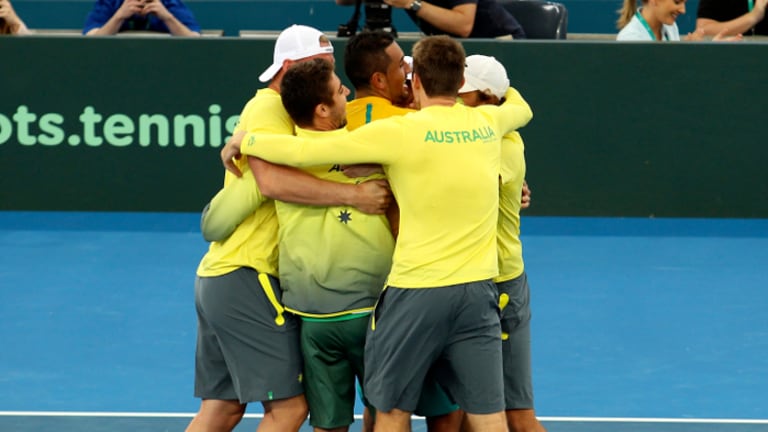Nick Kyrgios shot a look at the Australian Davis Cup team’s bench after hitting a winning shot on Sunday. He started to jerk his arms upward, in a signal to his teammates that they should get up and give him some more support. It’s a gesture you see a lot from Kyrgios on tour. When things aren’t going well, he can end up directing a fair amount of his frustration at his own player’s box.
This time, though, Kyrgios stopped himself before a rant could begin. He may be a rebel on the every-man-for-himself ATP tour, but inside Patrick Rafter Arena in Brisbane this weekend he was surrounded by Aussie legends like Lleyton Hewitt and Tony Roche, as well as a stadium full of his countrymen. So instead of yelling at them, and fighting himself, he went back to the business at hand, which was clinching Australia’s quarterfinal Davis Cup tie against the United States.
The 21-year-old Kyrgios has obviously had his differences with his country’s tennis officials in the past. He missed last year’s Davis Cup tie against the U.S., which Australia lost, and he was absent for the Rio Olympics. His flashy style, bad-boy behavior, erratic on-court effort, and frank ambivalence about how much he even wanted to play tennis seemed to be the antithesis of the no-nonsense Aussie tennis tradition.
Four months into 2017 and all of that has changed. Kyrgios has embraced the sport and his talent, and has seen his countrymen embrace him back. He has reached three semifinals, beaten Novak Djokovic twice, and played the match of the year against Roger Federer. Against the U.S., Kyrgios lived up to his role as Davis Cup anchorman. He beat two Top 30 opponents, John Isner and Sam Querrey, in straight sets. The fact that Kyrgios was favored to win both of those matches also may have made Jack Sock a little more nervous in his opening rubber, which he lost to the Aussie No. 2, Jordan Thompson.
